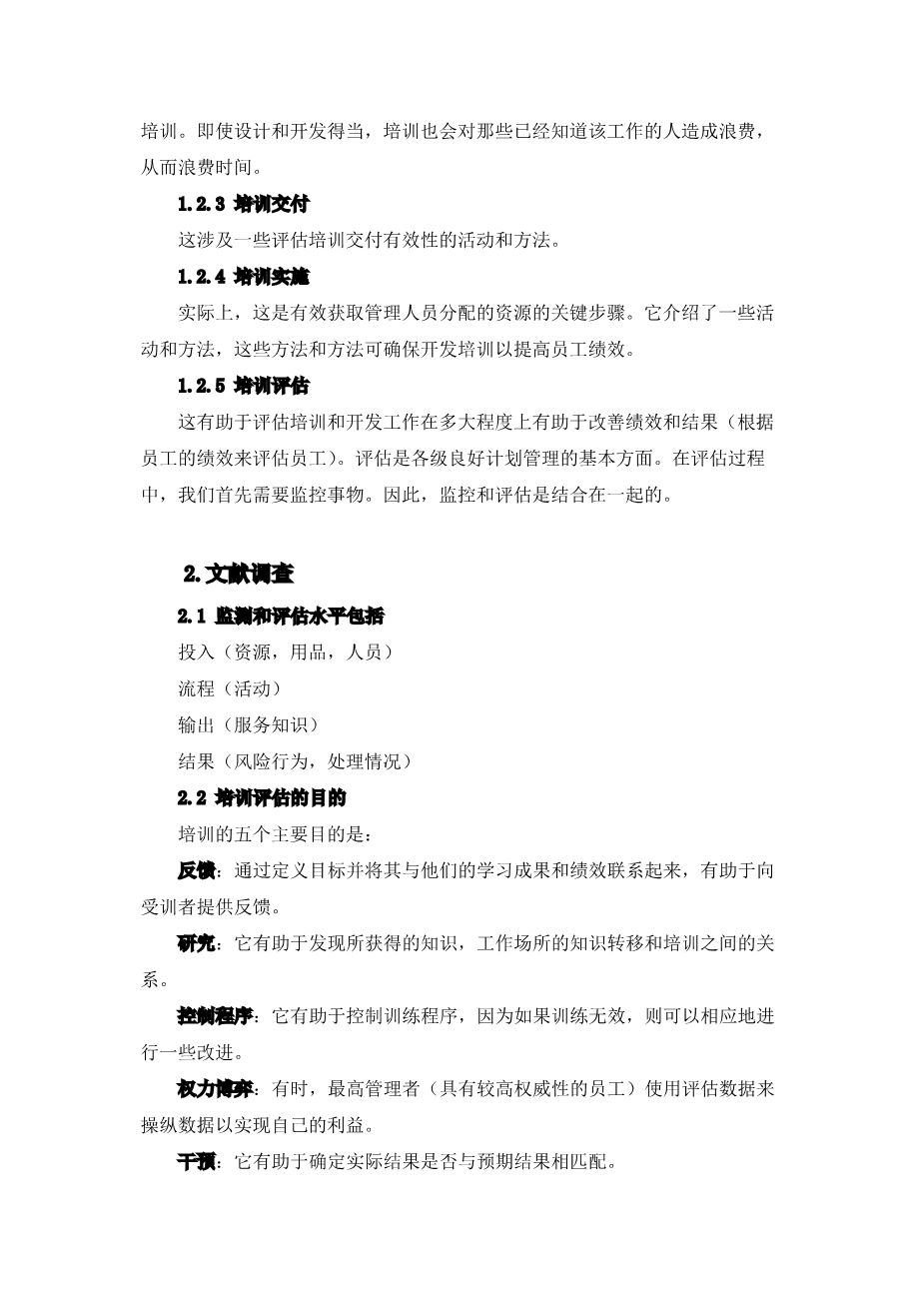Analysis and Evaluation of Training Effectiveness
Akhila Kunche*
,
Ravi Kumar Puli, Sunitha Guniganti, Danaiah Puli
N.I.T. Warangal Andhra Pradesh, India
Abstract Effective training is considered as an important factor in determining the efficiency of an organization which depends upon the capability of its employees. For training evaluation to be truly effective, the training and development itself must be appropriate for the person and the situation. Even though evaluation is listed at the last phase, evaluation actually happens during all the phases. It is used during the training process to evaluate the training process itself. Evaluation is not just for the trainer or organization it is absolutely important for the learner too. The purpose of this paper is to provide in- formation to evaluate and improve the effectiveness of training. One new model was found namely Back planning model. Which is same as Kirkpatrickrsquo;s model but the process occurs in the reverse order and continues in a cyclic process.
Keywords Effective Training, Evaluation
1. Introduction
1.1. Training
Training can be stated as the methods which are imparted to the employee in fulfilling the organizational goals. Organizations involving in the evaluation of training effectiveness are not only responsible for what the employees learn but they need to see that the knowledge which the employee gained is being applicable in their work perform- ance.so, Training and its regular evaluation would definitely make an organization to stand in the lime light in achieving the objectives. Organizations invest huge amounts for their employee training ex: Infosys and many other MNCrsquo;s.
1.2. Key Elements of Training Program Effectiveness
1. Training environment
2. Training Design and Development 3. Training Delivery
4. Training Implementation
5. Training Evaluation
1.2.1. Training Environment
The knowledge and skills of the trainee would also contribute in identifying whether the training process is effective or not. It also depends upon the organization to what extent it supports its employee in the training process. If the company refers to training as basic this wonrsquo;t yield much results. On the other hand if it refers training as advanced it would make trainees get motivated resulting in good performance.
1.2.2. Training Design and Development
In this stage, the organization should identify the skills and knowledge of the trainee. For this it requires properly de- signed and developed training. Even though properly de- signed and developed, the training would go waste for those people who already have knowledge on that job resulting in waste of time.
1.2.3. Training Delivery
This involves some set of activities and methods to evaluate training delivery effectiveness.
1.2.4. Training Implementation
This is in fact a critical step in getting the resources allocated by the management in an effective manner. It addresses some activities and methods which ensures that training to be developed for better performance of the employee.
1.2.5. Training Evaluation
This helps in assessing to what extent the training and development efforts contribute to improved performance and results (it evaluates the employee basing on his performance).Evaluation is the fundamental aspect of good program management at all levels. In the process of evaluation we first need to monitor the things. So both monitoring and evaluation come together.
2. Literature Survey
2.1. Levels of Monitoring and Evaluation Include
Input (resources, supplies, staff)
Process (activities)
Output (services knowledge)
Outcome (risk behavior, handling the situations)
2.2. Purpose of Training Evaluation
The five main purposes of training are:
Feedback: It helps in giving feedback to the trainees by defining the objectives and linking it to their learning out- comes and performance.
Research: It helps in finding out the relationship between acquired knowledge, transfer of knowledge at the work place, and training
Control program: It helps in controlling the training program because if the training is not effective then it can be dealt with accordingly with some advancement.
Power games: At times, the top management (higher authoritative employee) uses the evaluative data to manipulate it for their own benefits.
Intervention: It helps in determining that whether the actual outcomes are matched with the expected outcomes.
2.3. Process of Training Evaluation
Before Training: The learners (trainees) skills and knowledge are assessed before the training program itself. In the initial stage of training, candidates generally consider it as a waste of resources because most of the times they are unaware of the objectives and learning outcomes of the program. Once aware, they are asked to give their opinions on the methods used and whether those methods are preferred and applicable of their learning style.
During Training: It is the phase at which instruction is started. This phase usually consist of short tests at regular intervals and monitoring their daily performances.
After Training: It is the phase when learnerrsquo;s skills and knowledge are assessed again to measure the effectiveness of the training. This phase is designed to determine whether training has had the desired effect at individual departme
剩余内容已隐藏,支付完成后下载完整资料


英语译文共 15 页,剩余内容已隐藏,支付完成后下载完整资料
资料编号:[412676],资料为PDF文档或Word文档,PDF文档可免费转换为Word


